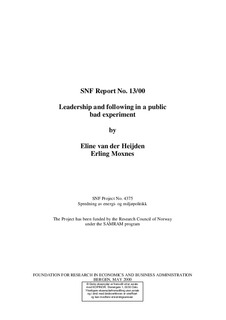Leadership and following in a public bad experiment
Research report

Åpne
Permanent lenke
http://hdl.handle.net/11250/164677Utgivelsesdato
2000-05Metadata
Vis full innførselSamlinger
- Reports (SNF) [542]
Sammendrag
With regard to global or regional environmental problems, do nations that take unilateral actions inspire other countries to curtail emissions? Using game theory, it has been shown that in a competitive situation, unilateral actions will both improve global welfare and lead to lower total emissions. For small nations, however, this effect is negligible. The earlier study explicitly leaves out the possibility that unilateral actions "might lead to similar behavior from other countries." This possibility is investigated in the present study by the use of a novel design of a laboratory public bad experiment with a leader. Nine groups of five subjects played the game twice, with two treatments. While the results are consistent with previous public bad experiments, the new and interesting finding is that there are significant effects of leader decisions on follower investments in the public bad. Comparing the two treatments, we find that there is a stronger effect of leadership when leaders face the same costs as followers than when they bear no costs. This suggests that fairness is an important motivating factor for the effect of leadership. Actually a two component model of the effects of leadership is found to be consistent with the data. In this model the most obvious effect of fairness is found to saturate. In addition there is a second effect, by which followers tend to imitate leaders. We cannot say if this tendency reflects some learning effort or an attempt to influence leaders. In one of the treatments, leaders were found to underestimate the effect of leadership. The project has been funded by the SAMRAM program under the Research Council of Norway.
Utgiver
SNFSerie
Report2000:13